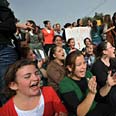
Settlers protest building freeze in Kedumim
צילום: AFP
A test we cannot fail
Israel must curb lawbreaking settlers or it may find itself facing Jewish intifada
The act of tearing up the construction freeze orders, which was the opening shot in the horror show we saw in the territories in recent days, was a much more symbolic act than its perpetrators dreamed it would be. It marked the detachment of these local council heads and their impassioned followers from the State of Israel and its laws.
As this camp is most concerned with historic justice, it would be worthwhile to take this opportunity to correct a great distortion, which may be semantic but is nonetheless fundamental: The people who tend to refer to themselves as “expelled” (in practice or potentially) are completely not so, simply because a sovereign state is entitled to evacuate some of its territory, modify its borders, and transport its citizens accordingly – into its up-to-date boundries. Expulsion, on the other hand, is the act of removing one out of the state’s borders, an act that was of course not undertaken in these cases.
Nonetheless, by tearing up government orders, blocking roads, and hurling stones at security forces, certain citizens are expelling themselves from the Zionist camp.
Perhaps we should not be surprised, as this may be a natural development. For too many years, and in too many situations, the Jews in the territories were accustomed to a law of their own, or to absence of laws. Still, the recklessness that started with tearing up orders is a major leap. Should this continue, settler leaders will officially turn themselves into members of a criminal organization.
A significant and therefore worrisome number of Israeli citizens who reside in the territories are rebelling against the government. They refuse to recognize its laws and its right to govern, and hence they can only realize their aims while disconnected from it and from its loyal subjects. However, life is tough: As long as they are part of the state, they must accept its authority, regardless of whether they like it or not.
Subversive conduct
These citizens have the right and even duty to protest, demonstrate, launch a public campaign, and of course turn to the courts. When they wish to do so, they are quite capable of making their way to the High Court of Justice. Yet their alternative – blatant violation of the law and violent resistance to its representatives – is making law-abiding Israelis sick and tired of them.
We can no longer reconcile ourselves to a situation where everyone is forbidden from doing what they’re allowed to do. It’s easy to predict what would happen to a Ramat Gan resident, and rightfully so, that tears up a parking ticket in the face of a police officer on the street, or prevents an inspector from entering the neighborhood on the grounds that this is his own territory and he will only let in “whoever he feels like” (as happened in Shilo last week.)
The citizens above the law have military allies; soldiers performing their regular army service who openly declare their partial and selective adherence to legal orders. Just like the abovementioned citizens cannot live in this state in line with their conscience, the refusenik soldiers cannot serve in this army in line with their conscience.
The law must be enforced on these citizens and soldiers. They must adhere to the rules of the game or find themselves out of it. And after all, we are not dealing with a game here. This subversive conduct threatens the normal existence of the state, and hence a hesitant or compromising reaction would not be shameful, but rather, destructive.
This is a test for the rule of law, for our democratic structure, and for our social order. We must not be confused or fail this test. Otherwise, after we faced two Intifadas, we may end up overwhelmed by the third one; the settler intifada.










